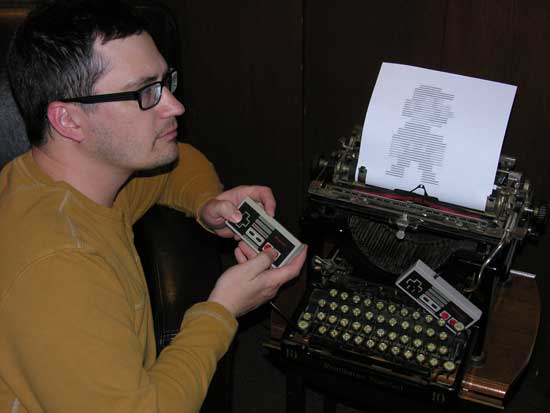
Classic video games might not seem like traditional fodder for a book of poems, but the surprise of it seems to be what Wisconsin-based poet BJ Best revels in. His new collection of prose poems, But Our Princess is in Another Castle, has just been released by Rose Metal Press and takes inspiration from such vintage arcade and home video games as Pac Man, Donkey Kong, Super Mario Brothers, and The Legend of Zelda. And while the focus of the book is playful and light-hearted (along with many of the individual poems contained within), Best reveals his extraordinary gifts as a poet by using Space Invaders and Dig Dug to explore love, loss, growing up and the existence of God.
BJ Best is the author of much, including the collections Birds of Wisconsin and State Sonnets, as well as the chapbooks Mead Lake, This and Crap. He has been nominated for seven Pushcart Prizes and was a finalist to serve as the Poet Laureate of Wisconsin. Recently, Best sat down with me for a late-night chat session to talk about the new book, his writing process, and why video games are so important.
A dear poet friend of mine often speaks of the idea of obsession in regards to poets and the subjects of their work—that is, one idea or theme or object they keep coming back to for further exploration. Is it fitting to say that video games function as one of your obsessions?
I’m not sure what divides the line between “obsession” and “intense interest,” but I think video games are the latter for me. Or, if they’re an obsession, they’re one of several. But I did find video games fascinating to write about. One reason is simply that they are so overlooked, and written off as brain-rotting ephemera. But more importantly, video games—and in particular classic video games—are flat-out weird, and it’s easy to forget that. What is a Pac-Man, and why is he haunted by ghosts? The fauna of The Legend of Zelda is equally nonsensical. And the cool thing is that any of these details can be a trigger to develop a poem.
Your previous collections, specifically Birds of Wisconsin and State Sonnets, are focused on an idea or set of ideas, as opposed to other collections of poetry that seem to be ‘best-of’ compilations. I’m curious how selecting a theme or idea influences the composition of both the individual poems and the overall projects?
Honestly, I don’t think I’d be able to write one of those books that’s more of an omnium-gatherum than anything. I’d find it very difficult to sit with my journal and fifty times in a row say, “Well, it’s time to write a new poem.” It’s much easier to be able to say, “Well, it’s time for another video game (or bird, etc.) poem.” At least it gives me a framework in which to build. Plus, I find research is cumulative. It’s weird to speak of playing video games as research, but it’s what I did—I revisited each of the games in the book (as well as plenty that didn’t make it in). So, once my mind starts thinking about the topic, it’s more likely to stay there.
Speaking of framework, can you talk a little about how you structured the collection? There’s a nice thematic progression from youth to adolescence to adulthood, and I’m wondering how much of that was conscious from the outset and how much of that you stumbled upon as you were writing?
The book’s structure is very deliberate. It’s something I try to do with each of my books, down to counting the number of poems in each section (either six or seven in this case). Here, I wanted the book to be mimetic of a video game, so it’s divided into nine shortish sections, similar to a video game’s levels. You’re right–the first half of the book is arranged chronologically. The title of the first section, “Beginning World,” more or less announces it as such. So the speaker moves from childhood to adolescence to heartbreak and transitioning into adulthood to a more stable love and finally to parenthood. After that, the subjects get a little more abstract and therefore a little more timeless. The second half of the book discusses bigger issues like death and God.
And I suppose most of the poems are based on my life in some way. But they’re certainly not intended as autobiography. I’m always interested in writing the best poem possible, and that often means changing or inventing details to get everything to hang together.
Given that the book consists of prose poems, it seems inevitable that some pieces are going to be more narrative-driven than others. Did individual games influence the structure or make-up of certain poems?
You know, I can’t point to many examples where a particular game impacted the a poem’s form. Writing this book taught me how to write prose poems, so many of them I think are fairly homogeneous. One exception is “Kid Icarus” early in the book—it explicitly uses the names of the levels of the game to divide the poem into sections. But now that you mention it, I see an abundance of three-paragraph poems. That must have been a comfortable length for me.
Author J. Robert Lennon once said that once you’ve written a novel, you don’t know how to write a novel, you only know how to write that novel. And while novels and poetry collections are different beasts, I think there’s some truth to the fact that you learn how to make a project work as you move through it, right? And perhaps that’s where the excitement comes from?
That’s definitely true. But I suppose the difference is here I had to write a prose poem more than 100 times, so I had to deal with all sorts of subjects and details and rhetorical problems along the way. So, after doing that, I feel reasonably confident I could take my framework for what I think a prose poem should do (and specifically how I can accomplish that) and apply it to any other surface subject. By surface subject, I mean the literal thing the poem is about–in this case video games. (Richard Hugo calls it the triggering subject.) But what I’m after is the “real” subject—love or death or faith—and though the surface subject might change, the “real” subjects are the ones that keep me writing.
It is exciting to see a project like this take shape, especially because there’s a bit of hubris saying you’re going to write fifty poems all on the same surface subject. You never know where it will end up, nor if it will be successful. I’ve gotten deep into a few projects and eventually decided they weren’t strong enough to continue.
100 times?
Yes. The manuscript as a whole went through no fewer than twenty drafts. I actually looked at the table of contents of the first draft the other day. There were 65 poems in that manuscript. Only 20 of those remain in the final book, and most were heavily revised. And certainly there were some that came and went in the interim.
Can we assume you’re not very precious with your work then? That you don’t mind writing something that might never see the light of day?
Definitely. I find that I don’t revise the way that a lot of other writers do (and the way that I teach my students, actually). I’m probably not willing to go through more than about three drafts of a piece—after which point it either sinks or swims for me.
You’re a professor of writing at Carroll University in suburban Milwaukee, and you also teach a freshman composition course on video game theory. I’m wondering how your students take to this subject matter, but also what you hope your students and your readers can learn from video games?
At the end of last semester, one of my students wrote in his final essay, “As soon as I saw ‘Video Games’ in the title of the course, I thought that the class would just be playing video games. Once the course started, I realized just how wrong I was.” And I think it’s that idea that applies to both the course I teach and the book. Many people assume that because video games are still a relatively new media, and one so firmly rooted in pop culture, that they can’t offer anything in the way of either analysis or art. My goal, as a teacher and as a poet, is often to ask someone to look more closely at something they might look at every day. There can be beauty or terror or all sorts of other complex ideas in things we presume are so simple as to be unworthy of consideration.
Likewise, I’ve written the book with a non-gamer audience firmly in mind. It’s my hope that you can not have played a single game in the book, but still understand and enjoy it.
I’d be remiss, given this whole discussion, if I didn’t ask what game(s) you’re playing right now? I mean, I assume you’re playing something, be it classic or modern.
The funny thing is my playing has really decreased in the past five years or so. We had a son who’s about to turn three, and that certainly has shifted my priorities away from gaming. So, if I do play something, it’s usually for five minutes here or there. As much as my thirteen-year-old self might hate to see it, I’ve definitely become more of a casual gamer. I visit Kongregate every once in a while for that fix. And every so often my wife and I will hook up the Atari and play for a bit after my son’s asleep. I play games when I’m teaching my freshman class, but it’s playing them for analysis rather than pleasure, so that doesn’t quite count, either. I did just win myself a copy of Snake Rattle ‘n Roll for the NES on eBay, so I’ll play that a bit when it arrives. It looks like the type of bizarre classic game I’d enjoy.
Clearly, you’re a busy guy, so I’m curious what’s next for you?
I’ve got several readings from the book over the next few months in the Midwest. I’m excited by all the positive response the book has gotten so far, so I’m looking forward to talking with more people about it.
My next book will be out at the end of this year. It’s called I got off the train at Ash Lake, and it’s a novella-in-verse, because apparently I can’t hold onto any one form for very long. I’m working with sunnyoutside for that one—they published my first book, State Sonnets. But in the short term, I’m just happy that this book is in the world and that people seem to be digging it. The editors at Rose Metal Press have been wonderful to work with, and I’m grateful for all their work in making my digital dreams a reality.
Follow Vol. 1 Brooklyn on Twitter, Facebook, Google +, our Tumblr, and sign up for our mailing list.


1 comment